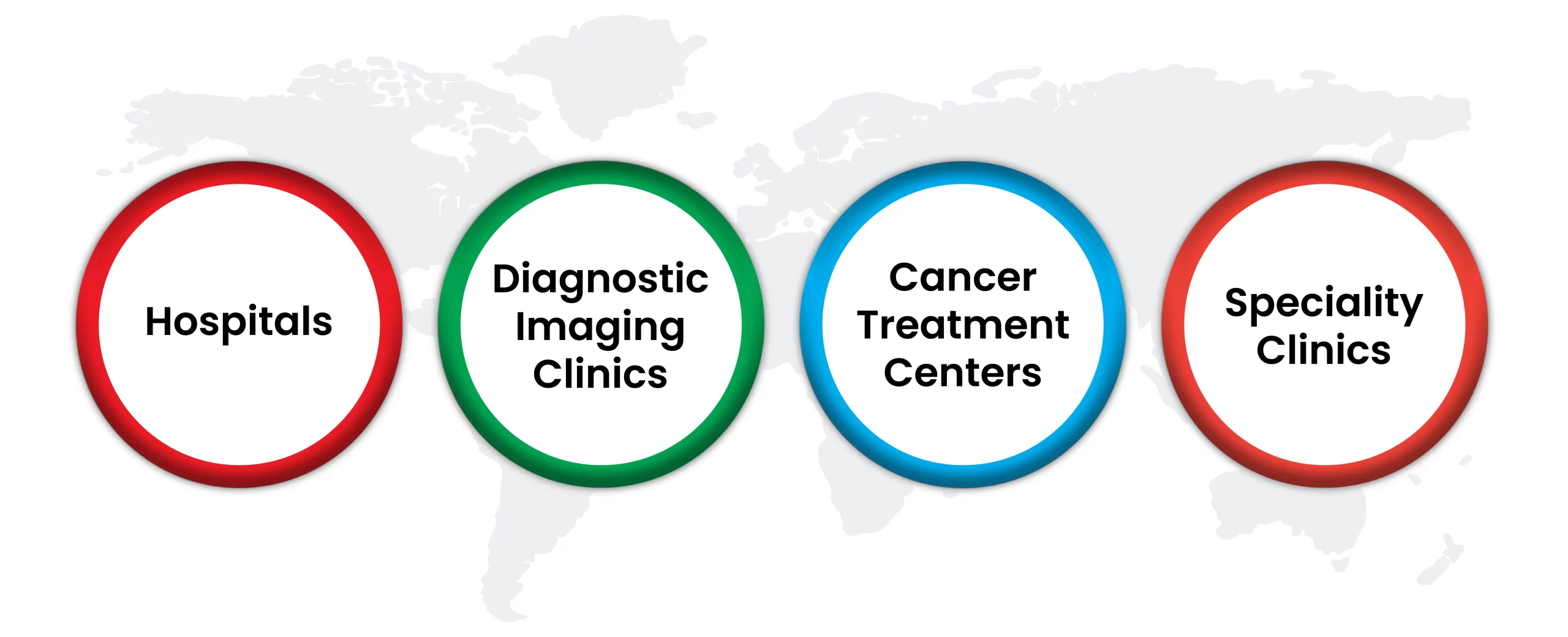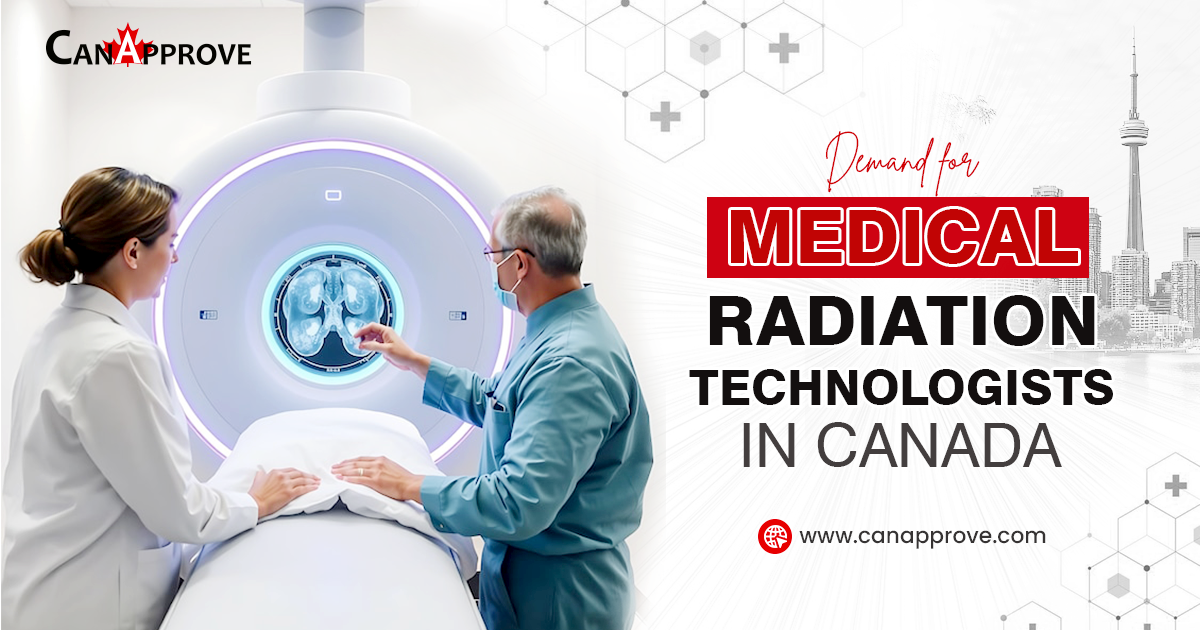Canada’s healthcare system is taking off and medical professionals are needed!
Medical Radiation Technology is one of those professions which are in raging popular demand. Medical Radiation Technologists in Canada use technologies like X-rays, CT scans, MRIs and nuclear medicine to diagnose and treat patients, and are an important contribution to Canadian healthcare and medical practice.
Whether you are considering a career in medical radiation technology or want to switch careers, Canada offers fabulous advancement opportunities for your career as well as true job satisfaction. In order to be successful in the field of medical radiation careers, it is important you are familiar with the requirements, earning potential, career paths and the techniques of finding a job for medical radiation tech careers in Canada.
Let’s take a closer look!
Table of Content
1Who is a Medical Radiation Technologist2Requirements to Become a Medical Radiation Technologist in Canada3Medical Radiation Technologist Programs in Canada4Medical radiation technologist jobs in Canada5Medical Radiation Technologist Salary in Canada6How To Immigrate To Canada As A Medical Radiation Technologist7Demand for medical radiation technologists in Canada from India8Conclusion9Frequently Asked Questions
Who is a Medical Radiation Technologist?
A Medical Radiation Technologist (MRT) is a healthcare professional who uses imaging technology to assist in the diagnosis and treatment of medical conditions. They operate specialized equipment like X-ray machines, CT scanners, MRI machines, and ultrasound devices to create images of the inside of the body.
Key responsibilities of an MRT include:
- Operating imaging equipment: They are skilled in using various imaging machines to produce clear and accurate images.
- Patient care: MRTs directly communicate with patients, telling them what will happen during the scanning procedures, explain how it works, ensuring their comfort, and taking them for the right scan.
- Image analysis: They evaluate images for abnormalities and also help in preparing reports for doctors.
- Radiation safety: However, to reduce radiation exposure for patients as well as for healthcare workers, they strictly follow safety protocols.
MRTs are playing an important role in the healthcare field as they supply crucial data for doctors to do diagnosis and planning for treatment.
Requirements to Become a Medical Radiation Technologist in Canada
To become an MRT in Canada, you must fulfill several educational and regulatory requirements. The primary steps include:
- 1. Education: You need a diploma or degree from an accredited Medical Radiation Technology program in Canada or an equivalent international qualification.
- 2. Certification: After completing your education, you must pass the Canadian Association of Medical Radiation Technologists (CAMRT) certification exam. This exam is essential for practicing in most provinces.
- 3. Licensing: Each province has its licensing body that requires MRTs to register. For instance, in Ontario, you would need to be licensed by the College of Medical Radiation and Imaging Technologists of Ontario (CMRITO).
- 4.Practical Experience: Clinical training is an integral part of MRT programs, and it makes sure that professionals have hands-on experience before entering the workforce.
Medical Radiation Technologist Programs in Canada
There are several high-quality MRT programs across Canada, and they typically take 2-4 years to complete, depending on the level of certification or degree. Some well-known institutions offering MRT programs include:
| Institutions | Courses |
| College of the North Atlantic | Radiologic Technology |
| Dalhousie University | Radiologic Technology Nuclear Medicine |
| University of Prince Edward Island | Radiologic Technology |
| University of New Brunswick | Radiologic Technology |
| College Communautaire du NB | Radiologic Technology |
| Dawson College | Radiologic Technology MRI |
| Collège Ahuntsic | Radiologic Technology Nuclear Medicine Radiation Therapy MRI |
| Algonquin College | Radiologic Technology |
| Mohawk-McMaster | Radiologic Technology Radiation Therapy |
| Michener Institute / University of Toronto | Radiologic Technology Nuclear Medicine Radiation Therapy |
| Fanshawe College | Radiologic Technology |
| Confederation College | Radiologic Technology |
| Collège Boréal | Radiologic Technology |
| Cambrian College | Radiologic Technology |
| Red River College Polytechnic | Radiologic Technology |
| Cancer Care MB/University of Winnipeg | Radiologic Technology Radiation Therapy |
| Saskatchewan Polytechnic | Radiologic Technology |
| Southern Alberta Institute of Technology | Radiologic Technology Nuclear Medicine |
| Northern Alberta Institute of Technology | Radiologic Technology MRI |
| University of Alberta | Radiation Therapy |
| British Columbia Institute of Technology | Radiologic Technology Radiation Therapy Nuclear Medicine MRI |
| College of New Caledonia | Radiologic Technology |
| Camosun College | Radiologic Technology |
These programs include theoretical learning and clinical placements, preparing students for the national certification exam and subsequent practice.
Medical Radiation Technologist Jobs in Canada
Canada has a strong demand for healthcare professionals, including Medical Radiation Technologists. MRTs can find work in a variety of healthcare settings, such as:

MRT jobs are available in nearly every province, with larger cities such as Toronto, Vancouver, and Calgary offering more opportunities. Rural and remote areas may also have high demand, often with incentives for professionals willing to relocate.
The job postings found are for all Medical radiation technologists (NOC 32121) in Canada as per Oct 2024 is given by:
| Location | Available jobs |
| Alberta | 6 |
| British Columbia | 2 |
| Manitoba | 2 |
| New Brunswick | 14 |
| Nova Scotia | 2 |
| Ontario | 20 |
| Québec | 13 |
| Saskatchewan | 6 |
This data will update every month so it is preferable to refer to the official Canada job bank site.
Medical Radiation Technologist Salary in Canada
In Canada, the salary for a Medical Radiation Technologist can vary depending on factors such as location, experience, and the specific healthcare facility. On average, the salary range for medical radiation technologists is typically between CAD 60,000 to CAD 90,000 per year.
Medical Radiation Technologist Salary in Canada for Indians
- Entry-level positions: Around CAD 60,000 to CAD 65,000 per year, which is approximately INR 36,00,000 to INR 39,00,000 per year.
- Mid-level technologists: Around CAD 70,000 to CAD 80,000 per year, which is approximately INR 42,00,000 to INR 48,00,000 per year.
- Experienced technologists or those in senior roles: Up to CAD 85,000 to CAD 90,000 per year, which is approximately INR 51,00,000 to INR 54,00,000 per year.
These figures are based on an exchange rate of 1 CAD ≈ 60 INR. Keep in mind that exchange rates can fluctuate, so the conversion may vary.
| Area | Average hourly salary |
| British Columbia | 39.00 |
| Alberta | 44.00 |
| Saskatchewan | 37.00 |
| Manitoba | 38.85 |
| Ontario | 42.00 |
| Quebec | 33.30 |
| New Brunswick | 33.00 |
| Nova Scotia | 35.84 |
| Prince Edward Island | 40.38 |
| Newfoundland and Labrador | 36.00 |
*These wages were updated on November 29th, 2023
The specific rates depend on factors such as:
Location: Salaries tend to be higher in urban areas like Toronto and Vancouver.
Experience: Entry-level MRTs typically start at the lower end of the salary range, with opportunities for increased earnings as they gain more experience and take on specialized roles.
Medical Radiation Technologist Salary in Canada for Different Roles
Below you’ll find an organized breakdown of Medical Radiation Technologist salary data in Canada across all roles, separated by X Ray Technician and by those handling CT Scans and MRIs.
X-ray Technician Salary in Canada
An X-ray technician or radiologic technologist focuses on imaging bones and organs using X-ray technology.
- Entry-level salary: Around CAD 55,000 to CAD 60,000 per year (approximately INR 33,00,000 to INR 36,00,000).
- Mid-level salary: Around CAD 65,000 to CAD 70,000 per year (approximately INR 39,00,000 to INR 42,00,000).
- Experienced professionals: Up to CAD 75,000 to CAD 85,000 per year (approximately INR 45,00,000 to INR 51,00,000).
CT Scan Technician Salary in Canada
CT scan technicians operate advanced machinery to perform computed tomography (CT) scans.
- Entry-level salary: Around CAD 60,000 to CAD 65,000 per year (approximately INR 36,00,000 to INR 39,00,000).
- Mid-level salary: Around CAD 70,000 to CAD 75,000 per year (approximately INR 42,00,000 to INR 45,00,000).
- Experienced professionals: Up to CAD 85,000 to CAD 90,000 per year (approximately INR 51,00,000 to INR 54,00,000).
MRI Technician Salary in Canada
An MRI technician specializes in using magnetic resonance imaging to capture detailed images.
- Entry-level salary: Around CAD 65,000 to CAD 70,000 per year (approximately INR 39,00,000 to INR 42,00,000).
- Mid-level salary: Around CAD 75,000 to CAD 80,000 per year (approximately INR 45,00,000 to INR 48,00,000).
- Experienced professionals: Up to CAD 90,000 per year (approximately INR 54,00,000).
These salaries can vary depending on the province, location, experience, and specific job roles within the medical radiation technology field.
How To Immigrate To Canada As A Medical Radiation Technologist
Canada’s immigration system provides numerous opportunities for healthcare professionals, including Medical Radiation Technologists (MRTs), to establish their careers in a strong healthcare environment. The country recognizes the vital role that MRTs play in the healthcare system, particularly as demand for these professionals continues to rise due to an aging population and advances in medical technology. This demand has led to the development of various immigration pathways, both at the federal and provincial levels.
Express Entry System
One of the primary routes for skilled workers, including MRTs, is the Express Entry system. This points-based immigration system evaluates candidates based on several factors, including age, education, work experience, and language proficiency. MRTs may qualify under two major programs within the Express Entry system:
- 1. Federal Skilled Worker Program (FSWP): This program is designed for individuals with foreign work experience who meet specific criteria, such as having at least one year of continuous full-time work experience in a skilled occupation. MRTs with relevant educational qualifications and work experience may find this pathway suitable.
- 2. Canadian Experience Class (CEC): This program is ideal for candidates who have already gained work experience in Canada. If MRTs have a valid job offer or have worked in Canada for at least one year in a skilled occupation, they can apply through the CEC to transition to permanent residency.
Provincial Nominee Programs (PNP)
In addition to the federal pathways, Canada’s provinces have their own Provincial Nominee Programs (PNPs), specifically targeting skilled workers to meet local labor market needs. Each province has unique eligibility criteria and application processes. Many provinces actively seek healthcare professionals, including MRTs, to fill critical gaps in their healthcare systems.
- Ontario: Ontario’s PNP has specific streams for healthcare workers, allowing MRTs to apply for provincial nomination if they have a valid job offer from an Ontario employer.
- British Columbia: This province offers the BC PNP, which has a dedicated stream for healthcare professionals. MRTs with job offers in the province can expedite their immigration process through this program.
- Saskatchewan: The Saskatchewan Immigrant Nominee Program (SINP) also emphasizes attracting healthcare professionals. MRTs are encouraged to apply through this program, especially if they have connections or job offers in the province.
Temporary Work Permits
Another pathway for MRTs looking to immigrate to Canada is through Temporary Work Permits. If an MRT has a job offer from a Canadian employer, they can apply for a work permit, allowing them to work in Canada temporarily. This pathway often leads to permanent residency, as work experience gained in Canada can enhance a candidate’s profile when applying through Express Entry or PNPs.
To qualify for a temporary work permit, applicants generally need a positive Labour Market Impact Assessment (LMIA) from their employer, demonstrating that no Canadian workers are available to fill the position. Once in Canada, MRTs can start working and gaining valuable Canadian experience, which can further facilitate their transition to permanent residency.
Demand for Medical Radiation Technologists in Canada from India
The demand for Medical Radiation Technologists (MRTs) in Canada is generally high, particularly due to the growing healthcare needs of an aging population and advances in medical technology. Here are some key points regarding the demand for MRTs in Canada, especially for those coming from India:
1. Healthcare Workforce Shortages
- Many provinces in Canada are experiencing shortages of healthcare professionals, including MRTs. This creates opportunities for foreign-trained professionals to fill these gaps.
- The Canadian government and provincial healthcare systems are actively seeking to recruit internationally educated healthcare workers.
2. Provincial Demand
- Specific provinces, such as Ontario, British Columbia, and Alberta, often have greater demand for MRTs due to their larger populations and healthcare facilities.
- Provincial Nominee Programs (PNPs) may prioritize healthcare professionals, making it easier for MRTs from India to immigrate to those regions.
3. Recognition of Foreign Credentials
- While there can be challenges in having foreign credentials recognized, organizations like the Canadian Association of Medical Radiation Technologists (CAMRT) provide pathways for internationally educated MRTs to get their qualifications assessed.
- A positive credential assessment can significantly enhance job prospects.
4. Job Opportunities
- Job postings for MRTs are available in hospitals, diagnostic imaging centers, and outpatient facilities. The positions often include roles in various imaging modalities such as X-ray, CT scans, MRI, and radiation therapy.
- Websites like Indeed, Workopolis, and provincial healthcare job boards frequently list openings for MRTs.
5. Language Proficiency
- Strong English (or French, depending on the province) language skills are essential for successful integration into the Canadian healthcare system. Proficiency can affect job prospects and is often required for immigration.
6. Community and Support
- Many communities in Canada have established support networks for international medical professionals, including mentorship programs, which can help newcomers navigate the job market.
Many provinces, such as Ontario and Alberta, actively recruit internationally trained medical professionals, and Canada immigration pathways for healthcare workers are often prioritized.
Conclusion
Medical Radiation Technologists play a vital role in Canada’s healthcare system, and the demand for qualified professionals is only increasing. Whether you’re a student considering a career in medical radiation technology or an internationally trained MRT looking to immigrate, Canada offers numerous opportunities. With competitive salaries, a strong job market, and various immigration pathways, now is a great time to consider a future as a Medical Radiation Technologist in Canada.
Do you need more information or help about your Canada PR or Canada immigration? Please, contact our team.






I am a Post Graduate in Radiation Therapy, Foreign Trained & having wide long experience in Teaching of Radiation Therapy Students at B.Sc.Medical Technology (RT) as well as M.Sc.Medical Technology (RT) levels.Teaching M.Sc.Medical Physics Course as well.
Hi Hardip Singh,
To assess your eligibility for opportunities in Canada or under the MATES visa program, we need more details about your age, university recognition, work experience, and English proficiency.
Connect with us for a personalized consultation, and our experts will guide you through the best possible pathways.
📩 Contact us today! https://canapprove.com/book-an-appointment/#immigration
I am a graduate( bsc) in radiotherapy technology in India. what are the requirements to work in canada? can you guide me step by step to apply for the job in canada
Hello Srinivasangokul,
Thank you for reaching out. As a graduate in Radiotherapy Technology, we’d be happy to guide you through the requirements to work in Canada.
Feel free to book a free consultation with us to get personalized advice and support.